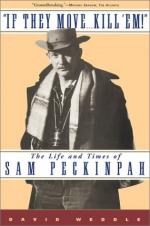|
This section contains 1,599 words (approx. 6 pages at 300 words per page) |

|
One of the ideas Peckinpah constantly illustrates in his films is that a moral code produced by one age or society is not necessarily valid in another. Thus the morality of a conventionally 'good' character—Steve Judd, let us say, in Guns in the Afternoon—may be implicitly criticised by Peckinpah as impractical in a contemporary context, derived as it is from old, received ethics rather than created out of the individual's own experience in his own age. Morality, Peckinpah suggests, should not be dependent on tradition, or on legislation, or on political or social ideologies. Once morality is made the province of a collective decision, or of a collective acquiescence in a pre-existing set of beliefs, the way has been opened for the suppression of individual choice.
The synthesis of individualism and survival, therefore, in Peckinpah's recent protagonists is not necessarily a moral fall from grace. Rather...
|
This section contains 1,599 words (approx. 6 pages at 300 words per page) |

|


